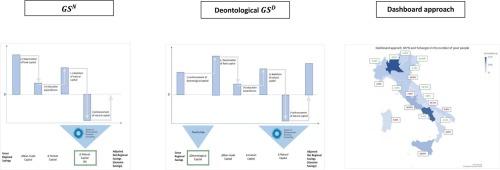Extending the Genuine Savings estimates with natural capital and poverty at the regional and national level in Italy
IF 6.6
2区 经济学
Q1 ECOLOGY
引用次数: 0
Abstract
Efforts to improve the Genuine Savings, a widely accepted index to assess the weak sustainability of an economy's development, have led to the creation of a broad body of literature that aims to produce more robust macroeconomic indicators for policy decision making. However, the various approaches to natural capital welfare accounting results in conflicting indicators of change. It is also the case that the inclusion of natural and social capital components is still scant. This paper addresses this gap by extending the traditional Genuine Savings methodology by including some natural capital components (e.g. flood protection, water purification) and the poverty dimension through a deontological approach. Although not offering a silver bullet solution, our approach proposes a pluralist and pragmatic improvement from ‘weak’ towards ‘stronger’ sustainability indicators. Results highlight the availability of data and information produced by different initiatives including the United Nations System of Environmental-Economic Accounting guidelines. The empirical application provides Genuine Savings estimates for Italy from 2006 to 2012 and from 2012 to 2015, shedding the light on the importance of natural capital and social considerations at national and regional level.

利用意大利地区和国家层面的自然资本和贫困问题扩展 "真正储蓄 "估算方法
真正储蓄是评估一个经济体发展的可持续性较弱程度的一个广为接受的指标,为改善这一指标所做的努力导致了大量文献的产生,这些文献旨在为政策决策提供更可靠的宏观经济指标。然而,自然资本福利核算的各种方法导致了相互矛盾的变化指标。此外,纳入自然资本和社会资本组成部分的情况仍然很少。本文通过扩展传统的 Genuine Savings 方法,纳入一些自然资本要素(如防洪、水净化),并通过去道德主义方法纳入贫困维度,弥补了这一不足。我们的方法虽然没有提供灵丹妙药,但提出了从 "弱 "到 "强 "的可持续发展指标的多元化务实改进方案。结果凸显了不同倡议(包括联合国环境经济核算体系指南)所提供的数据和信息的可用性。实证应用提供了意大利 2006 年至 2012 年和 2012 年至 2015 年的创收估算,揭示了自然资本和社会因素在国家和地区层面的重要性。
本文章由计算机程序翻译,如有差异,请以英文原文为准。
求助全文
约1分钟内获得全文
求助全文
来源期刊

Ecological Economics
环境科学-环境科学
CiteScore
12.00
自引率
5.70%
发文量
313
审稿时长
6 months
期刊介绍:
Ecological Economics is concerned with extending and integrating the understanding of the interfaces and interplay between "nature''s household" (ecosystems) and "humanity''s household" (the economy). Ecological economics is an interdisciplinary field defined by a set of concrete problems or challenges related to governing economic activity in a way that promotes human well-being, sustainability, and justice. The journal thus emphasizes critical work that draws on and integrates elements of ecological science, economics, and the analysis of values, behaviors, cultural practices, institutional structures, and societal dynamics. The journal is transdisciplinary in spirit and methodologically open, drawing on the insights offered by a variety of intellectual traditions, and appealing to a diverse readership.
Specific research areas covered include: valuation of natural resources, sustainable agriculture and development, ecologically integrated technology, integrated ecologic-economic modelling at scales from local to regional to global, implications of thermodynamics for economics and ecology, renewable resource management and conservation, critical assessments of the basic assumptions underlying current economic and ecological paradigms and the implications of alternative assumptions, economic and ecological consequences of genetically engineered organisms, and gene pool inventory and management, alternative principles for valuing natural wealth, integrating natural resources and environmental services into national income and wealth accounts, methods of implementing efficient environmental policies, case studies of economic-ecologic conflict or harmony, etc. New issues in this area are rapidly emerging and will find a ready forum in Ecological Economics.
 求助内容:
求助内容: 应助结果提醒方式:
应助结果提醒方式:


